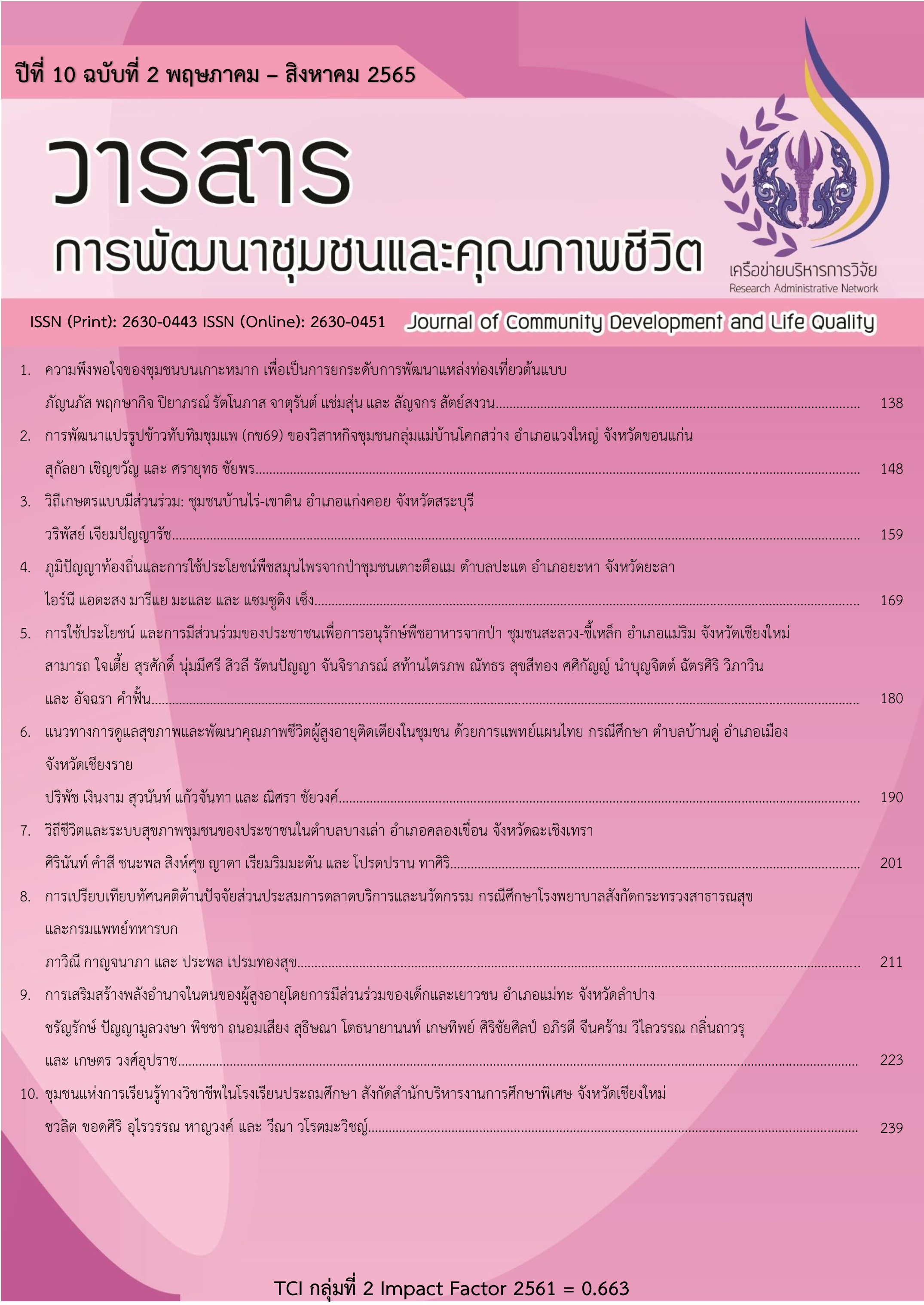การเปรียบเทียบทัศนคติด้านปัจจัยส่วนประสมการตลาดบริการและนวัตกรรม กรณีศึกษาโรงพยาบาลสังกัดกระทรวงสาธารณสุขและโรงพยาบาลทหารบก
Main Article Content
บทคัดย่อ
งานวิจัยเปรียบเทียบทัศนคติด้านปัจจัยส่วนประสมการตลาดบริการและนวัตกรรม กรณีศึกษาโรงพยาบาลสังกัดกระทรวงสาธารณสุขและโรงพยาบาลทหารบก มีวัตถุประสงค์เพื่อศึกษาทัศนคติด้านปัจจัยส่วนประสมการตลาดบริการและนวัตกรรมและความพึงพอใจของผู้ใช้บริการของโรงพยาบาลสังกัดกระทรวงสาธารณสุขและโรงพยาบาลทหารบก เครื่องมือที่ใช้ในการวิจัยเป็นแบบสอบถาม การเก็บรวบรวมข้อมูลใช้วิธีการเลือกตัวอย่างแบบโควต้า เก็บรวบรวมข้อมูลจากกลุ่มตัวอย่าง จำนวน 450 คน ผลการวิจัยพบว่า ผู้ใช้บริการโรงพยาบาลสังกัดกระทรวงสาธารณสุขและโรงพยาบาลทหารบกมีทัศนคติต่อปัจจัยส่วนประสมการตลาดบริการและนวัตกรรมแตกต่างกันที่ระดับนัยสำคัญทางสถิติ 0.05 ในด้านผลิตภัณฑ์, ราคา, สถานที่, ลักษณะทางกายภาพ, กระบวนการให้บริการ, นวัตกรรมผลิตภัณฑ์ และนวัตกรรมกระบวนการ ผลการทดสอบความแตกต่างของความพึงพอใจระหว่างผู้ใช้บริการของโรงพยาบาลทั้งสองสังกัดแสดงให้เห็นว่า มีความพึงพอใจแตกต่างกันที่ระดับนัยสำคัญทางสถิติ .05 ในด้านการประสาน, ขั้นตอนการให้บริการ และด้านการได้รับคำแนะนำและการให้คำปรึกษา ผลจากงานวิจัยนี้สามารถก่อให้เกิดองค์ความรู้ที่เกิดขึ้นจากการเรียนรู้ร่วมกันของโรงพยาบาลทั้งสองสังกัดเพื่อเป็นแนวทางบรรลุการปฏิบัติที่ดีที่สุดสืบไป
Article Details

อนุญาตภายใต้เงื่อนไข Creative Commons Attribution-NonCommercial-NoDerivatives 4.0 International License.
กองบรรณาธิการขอสงวนสิทธิ์ในการตรวจและแก้ไขบทความที่เสนอเพื่อตีพิมพ์ในวารสารการพัฒนาชุมชนและคุณภาพชีวิต
บทความหรือข้อความคิดเห็นใด ๆ ที่ปรากฏในวารสารการพัฒนาชุมชนและคุณภาพชีวิต เป็นวรรณกรรมของผู้เขียนโดยเฉพาะคณะผู้จัดทำไม่จำเป็นต้องเห็นด้วย และไม่ใช่ความรับผิดชอบของมหาวิทยาลัยและคณะผู้จัดทำ / บรรณาธิการ
เอกสารอ้างอิง
Arkhipova, M. and V. Rogovchenko. 2021. Impact of healthcare innovation on the population’s well-being in Russia. Journal of Physics: Conference Series 1784: 012006, doi: 10.1088/1742-6596/1784/1/012006.
Bakti, I. G. M. Y., T. Rakhmawati, S. Sumaedi, T. Widianti, M. Yarmen and N.J. Astrini. 2020. Public transport users’ WOM: An integration model of the theory of planned behavior, customer satisfaction theory, and personal norm theory. Transportation Research Procedia 48: 3365–3379.
Bird, M., M. McGillion, E. M. Chambers, J. Dix, C. J. Fajardo, M. Gilmour, K. Levesque, A. Lim, S. Mierdel, C. Ouellette, A. N. Polanski, S. V. Reaume, C. A. Whitmore and N. Carter. 2021. A generative co-design framework for healthcare innovation: Development and application an end-user engagement framework. Research Involvement and Engagement 7(12), doi: 10.1186/s40900-021-00252-7.
Collins, J. M. and M. K. Dempsey. 2019. Healthcare innovation methodology: codifying the process of translating knowledge into better healthcare products, services, and procedures. Current Opinion in Biomedical Engineering 11: 16-21.
Dobrzykowski, D. D., S. K. Callaway and M. A. Vonderembse. 2015. Examining pathways from innovation orientation to patient satisfaction: A relational view of healthcare delivery. Decision Sciences 46(5): 863-899.
Fongkerd, S., S. Sinsuesatkul and S. Tantalanukul. 2020. Innovative proactive health services: The role of community nurse practitioners in response to Thailand 4.0. Nursing Journal of the Ministry Public Health 30(2): 10-22. (in Thai)
Grimaz, S., E. Ruzzene and F. Zorzini. 2021. Situational assessment of hospital facilities for modernization purposes and resilience improvement. International Journal of Disaster Risk Reduction 66: 102594, doi.org/10.101/j.ijdrr.2021.102594.
Habidin, N. F., N. A. Khaidir, N. A. Shazali, N. Ali and N. H. Jamaludin. 2015. The development of process innovation and organisational performance in Malaysian healthcare industry. International Journal of Business Innovation and Research 9(2): 148-162.
Halfmann, S. S. G., N. Evangelatos, E. M. Kweyu, C. DeVilliers, K. Steinhausen, A. V. D. Merwe and A. Brand. 2019. The creation and management of innovations in healthcare and ICT: The European and African experience. Public Health Genomics 21: 197–206.
Holden, R. J., M. A. Boustani and J. Azar. 2021. Agile innovation to transform healthcare: Innovating in complex adaptive systems is an everyday process, not a light bulb event. BMJ Innovations 7(2): 499-505.
Kanjanawasri, S. 2013. Classical Test Theory. 7nd ed. Chulalongkorn University Printing House, Bangkok. 301 p. (in Thai)
Khodadad-Saryazdi, A. 2021. Exploring the telemedicine implementation challenges through the process innovation approach: A case study research in the French healthcare sector. Technovation 107: 102273, doi:10.1016/j.technovation.2021.102273.
Kus, K., T. Arlinghaus, P. Kajuter and F. Teuteberg. 2021. Success factors of case management software supporting healthcare patient services - A user-driven perspective. (Online). Available:https: //aisel.aisnet.org/amcis2021/healthcare_it/sig_health/22/ (December 3, 2021).
Masena, P. and P. Nantiyakul. 2014. The administration of hospital service quality in the Ministry of Public Health. EAU Heritage Journal 4(1): 88-101. (in Thai)
Morales-Contreras, M. F., P. Chana-Valero, M. F. Suarez-Barraza, A S. Diaz and E. G. Garcia. 2020. Applying lean in process innovation in healthcare: The case of hip fracture. International Journal of Environmental Research and Public Health 17(15): 5273, doi: 10.3390/ijerph17155273.
Omachonu, V. K and N. G. Einspruch. 2010. Innovation in healthcare delivery systems: A conceptual framework. The Innovation Journal: The Public Sector Innovation Journal 15(1): 2-20.
Panpinit, S. 2006. Research Techniques in Social Science. 2nd ed. Wittayapat, Bangkok. 504 p. (in Thai)
Proksch, D., J. Busch-Casler, M. M. Haberstroh and A. Pinkwart. 2019. National health innovation systems: Clustering the OECD countries by innovative output in healthcare using a multi-indicator approach. Research Policy 48(1): 169-179.
Ravangard, R., A. Khodadad and P. Bastani. 2020. How marketing mix (7Ps) affect the patients’ selection of a hospital: experience of a low-income country. Journal of the Egyptian Public Health Association 95(25): 1-8.
Saenprasarn, P., C. Sukkawarn, N. Pitsachat, J. Prommobol, W. Wanichpunchaphol and U. Chooha. 2017. The study of the factors related with ethical decision-making on nursing risk in clinical practical of army nursing staff. Journal of the Royal Thai Army Nurses 18(3): 201-208. (in Thai)
Teerasantikul, P., K. Rithmun, Y. Kim, N. Chaiyai, A. Arrahimee and K. Janyam 2022. Training of people with disabilities: New presentation through innovative leadership. Journal of Community Development and Life Quality 10(1): 106-116. (in Thai)
Wen, J., P. Deng, Q. Fu and C. Chang. 2022. Does health innovation relieve disease burden? The comprehensive evidence. Technological Forecasting and Social Change 174(11): 121202, doi: 10.1016/j.techfore.2021.121202.


